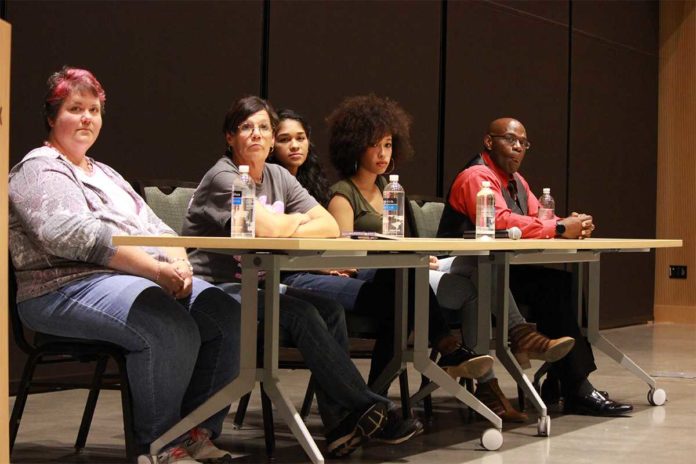Students and staff of Slippery Rock University who are curious about the cultural meaning of hair, loss of hair and maintenance of hair in our society attended a panel hosted in the Robert M. Smith Student Center Theater on Wednesday.
Director of Gender Studies, Cindy LaCom, co-hosted the panel with Corinne Gibson, the director of the Office of Multicultural Development. Panelists spoke to support the argument that hair has a greater impact on our culture than most assume.
“The idea for the program originated with discussions about how black women in the U.S. face cultural pressure to “manage” their hair to approximate white standards, but it moved quickly to a consideration of hair more generally,” LaCom said. “Because I have a family member who had to deal with losing her hair during chemo and figuring out how to address peoples’ stares, questions, curiosity and occasional unkindness, we thought it would be useful to include that perspective, and because men also have body image challenges that are too often left out of analyses of gender, we wanted to include a man’s insights.”
Medical treatments have uncontrollable effects on a person’s body, hair loss being one of several noticeable changes. Panelist Beth Neese took the opportunity to discuss her personal experience with losing her hair due to chemotherapy.
“I found out I had breast cancer last March, and the whole thing with hair? Yeah, I was afraid of losing it,” Neese said. “After my first treatment with chemotherapy, someone said everyone’s treatment is different. Some women lose their hair and some women don’t. Well, the day after my first treatment, I shaved my head. It was the only thing I had control over. I didn’t have control over anything going on with my body, so it was the one thing I could take care of on my own.”
The panel argued the white standards of beauty. Junior integrated marketing major Catharyn Burton shared her struggle with accepting her hair, especially because of her different racial background.
“[My hair] kind of became an identifier for me,” Burton said. “I’m kind of the girl with the ‘fro, but I think it is important to understand that that is not who I am. Although I love my hair and I embrace my hair, I am not just the girl with the ‘fro.”
Enrollment Services employee Michael White spoke about baldness from the male perspective. A double standard for men and women exists in our culture, where baldness for men is more readily accepted.
“I was a professional working in the field of admissions and I was at a conference, and I kept my hair very short,” White said. “That morning I got up and I thought to myself, ‘I need to cut my hair,’ so as I was doing it, I nicked it badly. I couldn’t go around with this nick, so I decided to cut it all off. I did not think about my professional stature. I did not think about what my wife might say. I did not think about what my friends might say. I just decided to do it, because it made sense. But what happened that day was, people embraced my baldness, a lot. I got a lot of compliments, so I decided to keep shaving regardless of what others might think.”
The presence of varying gender roles in relation to short hair was debated during the panel. Audience member Jasmine Kostenbader, a female student with short hair, expressed her thoughts on the topic through her own association.
“People treated me very differently when I cut my hair,” Kostenbader said. “I like to do dramatic changes, but when I cut my hair, people don’t treat me as feminine. I am still exactly who I am. People don’t take me seriously as a female with short hair, and I don’t know why, because it’s just my hair. I wear the same outfits that I wore when I had long hair. It’s very confusing.”
Audience member Candice Robinette described a societal belief that long hair equates to beauty and femininity. The media defines beauty in a way that most women cannot compare to and long hair is a usual attribute depicted.
“I used to compete in beauty pageants,” Robinette said. “Before you compete, you go to events, and they tell you what you need to do in order to get ready for the pageant. One of the big things they told me was that I need to get extensions… I always just thought it was an interesting experience for me; someone telling me that in order to be beautiful [my] hair has to be long.”
The panel allowed students and staff to become mindful of the value society puts on hair. The choices, or in some cases the lack thereof, people make concerning hair has an effect.
“We hope that students walk out with a sense of personal power in terms of the choices they might make about their hair as a cultural marker of meaning,” LaCom said.








